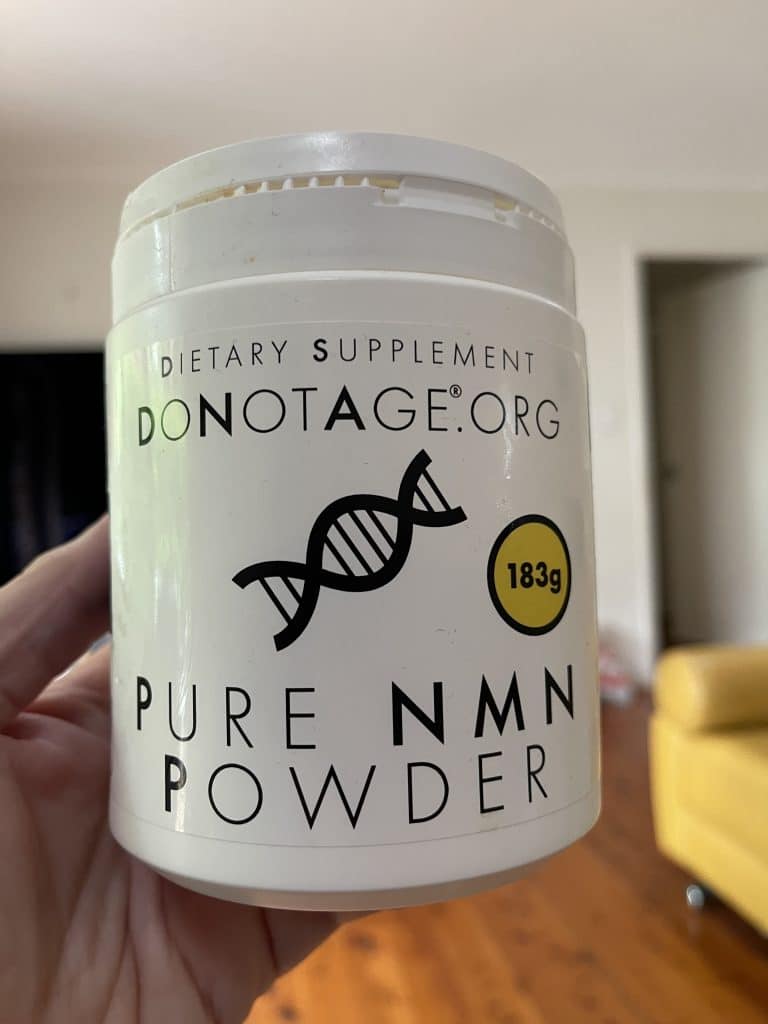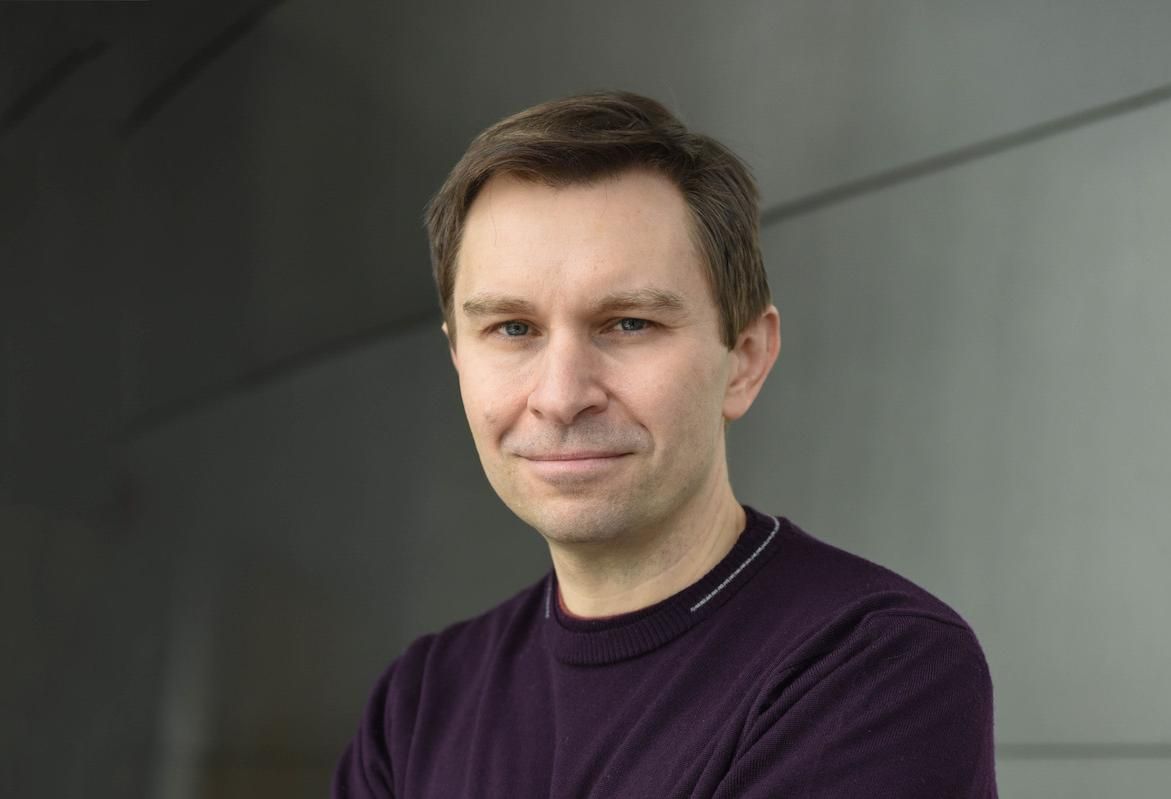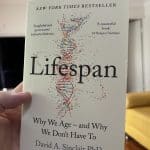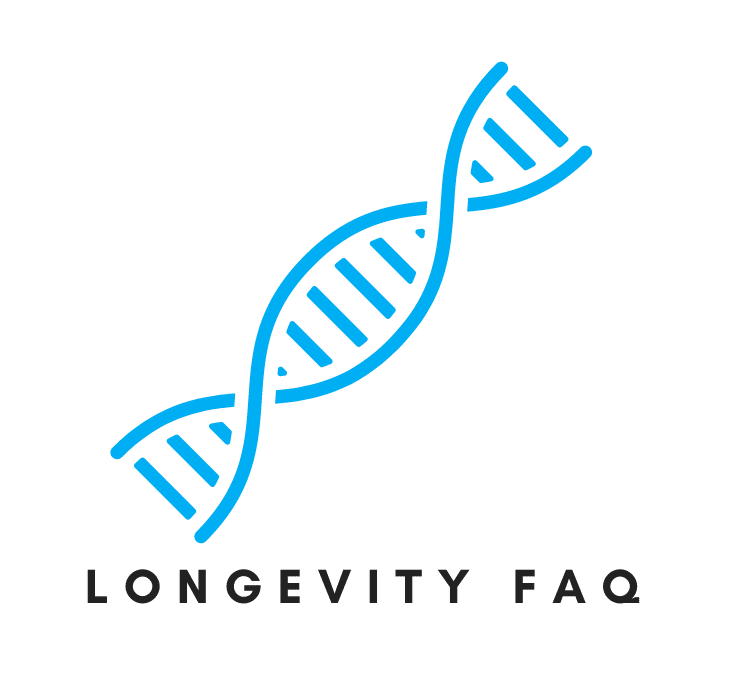Table of Contents
David is quite open about his supplement stack detailing much of it in his book with updates in more recent interviews, below I have compiled a list of Dr. David Sinclair’s Supplements:
Mornings
- NMN – 500 mg (half a gram) daily in the morning (Recent video below confirming the change)
- Resveratrol – 1g / 1000 mg in the morning daily; the effectiveness of resveratrol is increased when dissolved in or taken with high fat, so Dave takes it with a yogurt he makes at home, as below.
- Yoghurt Bravo Pro Biotic
- Quercetin – 500 mg daily with the above yogurt
- Fisetin – 500 mg daily with the above yogurt
- Spermidine – 1 g/1000 mg daily
Evenings
- Metformin 1 g in the evening (Does not take on days he goes to the Gym); note most countries, Metformin is a prescription medication for Type 2 diabetes, which has been shown to decrease the risk of cancer and heart disease.
Other supplements that David experiments with or has discussed
- Vitamin D3
- Vitamin K2
- Omega-3 Fish Oil
- Alpha Lipoic Acid
- Coenzyme Q10 (CoQ10)
- Aspirin – 81mg daily, often referred to as baby aspirin
- Statin
- Rapamycin
If you have questions, additional insights, or other opinions, please comment below or via the Green comment bubble on the left.
Other than Supplements, what else does Dave do to improve his Lifespan?
Besides supplements and medications, we can increase our lifespan and health span by Diet, Exercise, and looking after ourselves. It’s essential to note improving diet and exercise should be the first step to increasing longevity and should be the foundational building blocks that supplements can then enhance.
- Reducing or Avoiding sugars and refined carbohydrates – directly from Lifespan book David Sinclair says he keeps his sugar, bread, and pasta intake as low as possible. He gave up desserts at 40 apart from stealing an occasional taste (Page 304).
- Intermittent fasting – on most days, he follows a 20/4 fasting plan by skipping both breakfast and lunch—periods of huger including some calorie restriction to increase sirtuin activation.
- He is not vegetarian – However, Dr. Sinclair recently mentioned on Twitter that he tries to eat more plants than if all food was equally healthy.
- Limiting Protein Intake – Along with mostly avoiding eating meat he also limits his protein intake.
- Cardio fitness – Dr. Sinclair does cardio fitness, usually running twice weekly.
- Resistance/strength training – David does resistance training (lifting) 3 times a week, usually combining this with Sauna. Also, as mentioned in his supplement stack above, he does not take Metformin the night before his resistance training day.
- Sauna – The research has shown that a regular Sauna 3+ times a week reduces all-cause mortality by up to 25%, and David usually goes to the Sauna at least once per week.
- Hydration – David Sinclair keeps hydrated by drinking plenty of water.
- Low Body temperature – Tries to keep cooler and recommends keeping cool when sleeping, with a recommended room temperature around 18 degrees Celsius(64.4 deg Fahrenheit)
- Sleep – Getting plenty of sleep, and David talks about this challenge; on a side note, NMN has been found to help with sleep deprivation (but we don’t recommend using NMN to combat repeated sleep deprivation)
Further Details on David’s Supplement Stack
NMN
Nicotinamide Mononucleotide (NMN) is an NAD+ precursor, meaning that the NMN consumed as a supplement is then converted into NAD+. NMN is also sometimes referred to as a NAD booster that is important for cellular health optimization.

David takes this supplement to boost his NAD+ levels because it’s the fuel of our mitochondria, and as we age, levels decrease; research on mice and humans has found that boosting NAD levels improves the hallmarks of aging.
While David takes 1,000 mg 500 mg daily, some research suggests that NAD levels can be adequately boosted with as little as 250 mg daily.
David Sinclair had originally written in Lifespan (page 304) that he takes 1g; he also mentioned this in several old videos and podcasts; however, in a recent video from 2023, he states that he takes “half a gram” or 500 mg. You can watch the video below:
What’s my take on his use of NMN? It’s an exciting supplement that every biohacker should look into including in their stack. It’s a supplement I included in my stack in early 2020. I have seen great results, including increased energy and a noticeable increase in NAD+ levels in my regular NAD level test.
For a more in-depth look at NMN, read my article: The Ultimate NMN Supplementation Guide What are its Benefits, Side-Effects, Dosage & Cost?
Resveratrol
David takes resveratrol to activate the deacetylase Sirtuin 1 (SIRT1) gene; this gene found from research to increase longevity is usually only activated when our bodies are under physical stress, i.e., exercise, restricted eating, extreme cold and hot. By taking resveratrol, we are tricking our bodies into thinking it’s stressed and, as such, activates SIRT1 and hopefully increase our longevity. Resveratrol is one of the most popular anti-aging polyphenols.
David supplements with trans-resveratrol instead of cis-resveratrol as the trans isomer version is more biologically available, meaning more of it will enter your bloodstream. Unfortunately, the cis variety is found in many supplements on the market. There are also some proponents of a micronized version to increase bioavailability further.
What’s my take on his use of Resveratrol? Resveratrol is a contentious supplement as there is conflicting research on its effectiveness on human longevity; from the research I have read, I am convinced there are benefits which is why I have included it in my stack.
For a more detailed look at resveratrol, you can read my article: The Best Resveratrol Supplement Guide: Benefits, Side Effects & More
Quercetin
Quercetin is a recent addition to David’s supplement stack that he has added since writing Lifespan. Quercetin is a flavonoid naturally found in berries, apples, and green tea that is a potent antioxidant [r][r] which has the benefit of Sirtuin activation, reducing senescent cells, fighting inflammation [r], and increasing the efficiency of resveratrol which may also reduce blood pressure and lower the risk of chronic brain disorders.
What’s my take on his use of Quercetin? From the reading and research that I have done on Quercetin, I have found a good amount of evidence (see links to references) in supplementing (note the average adult only gets 80 mg daily naturally in their diet) at 500 mg per day; however, I do this for a maximum of 10 weeks and then have a 5-week break before I start another 10 weeks of it.
For more information, read my full guide here: Quercetin Supplement Guide – Benefits, Dose, and Side-Effects.
Fisetin
Fisetin is another supplement I found Dave has only just added to his supplement stack after the release of his 2019 book Lifespan Why We Age – and Why We Don’t Have To, like Quercetin he takes 500mg in the morning with the Bravo Pro-Biotic that he makes at home.
Also, like Quercetin, Fisetin is another flavonoid found with the highest concentrations in nature in strawberries and apples.
An interesting fact I found in my research is that Fisetin and Quercetin are the most prevalent plant flavonoids and are responsible for giving fruits and vegetables their bright colors.
Again, like Quercetin, Fisetin is a senolytic compound which means it’s responsible for the clearing of senescent cells [r], getting rid of these dying zombie cells before they can damage the body by secreting inflammatory substances, as you would expect being senolytic like Quercetin research has found it has similar benefits to longevity including reduced inflammation [r], neuroprotection, increased cognitive function and a Chemotherapeutic [r] which research suggests can suppress metastasis and increase apoptosis. However, research suggests that fisetin is a more powerful senolytic than quercetin.
What’s my take on his use of Fisetin? From my research, it’s another effective flavonoid that has shown to increase healthspan; some research suggests it’s one of the most effective senolytics, even more effective than Quercetin, I take 500 mg daily, but also like Quercetin, I take a periodic break.
Spermidine
Spermidine is a new supplement to hit the longevity space, and David has recently mentioned that he now takes 1,000 mg daily of this supplement. Spermidine is a polyamine known for activating autophagy, which may decrease the occurrence of age-related diseases.
Benefits found in research include increased cognitive function in older adults with dementia [r] and upregulate Sirtuin 1, which may help to prevent liver damage; spermidine has also been found to prolong the growth phase of hair follicles, resulting in a thicker head of hair.
What’s my take on his use of Spermidine? Another promising supplement that in my research on the topic, I have found many positive benefits to health and health span that is also very safe; I am personally taking a single capsule once per day that contains 8 mg; I am taking Spermidine for its cognitive benefits along with a hopeful improvement in my head of hair.
For a more in-depth look at Spermidine, please read my article: Health and Longevity Benefits of Spermidine.
Metformin
Dave takes 1g of Metformin in the evening, except on evenings before a strength training workout, because Metformin has been found to suppress the benefits of exercise; another side effect is that it can cause stomach upset and, in some cases, diarrhea. In most countries, Metformin is a medical drug that requires a medical doctors/Physician’s script/prescription.
Rapamycin
While Dave does not take rapamycin, he discusses it extensively in his book and also in recent interviews; rapamycin is a powerful mTOR inhibitor that has been shown in research to both slow the aging process and extend lifespan; this same research shows that it currently the most effective (in terms of biological age reversal) drugs, however, Rapamycin’s primary use is as a drug to prevent organ transplant rejection, that is normally used under close medical supervision as it has been found to suppress the immune system.
Who is Dr. David Sinclair?

Dr. Sinclair is a Professor of genetics and co-Director of the Paul F. Glenn Center at Harvard Medical School and also a Professor at the University of New South Wales known for his longevity research and has come into the public spotlight as the author of the New York Times best seller Lifespan: Why We Age – and Why We Don’t Have To (Amazon link), in this book on of concepts that stood out the most was on his information theory of aging and his detailed explanation on the mTOR and AMPK pathways. David has been at the forefront of research that has brought about many of the most recent anti-aging breakthroughs in age reversal science.
Born in Sydney, Australia, in 1969, Dr. Sinclair looks years younger than his current age of 50; it’s hard not to think that his youthfulness is partially due to his daily anti-aging supplements.
Being a researcher with strict ethics, Dr. Sinclair doesn’t promote any products; however, in his book and on several of the podcasts he has been interviewed on, including Joe Rogan Experience, he has detailed the types of supplements he takes and what else he does to extend his lifespan.
Dr. Sinclair’s most recent published research from January 2023 found that “a breakdown in epigenetic information causes mice to age and that restoring the integrity of the epigenome reverses those signs of aging.” [ r ]


Above is my copy of Dr. David Sinclair’s Book Lifespan: Why we Age and – and Why we don’t Have To, along with the relevant page 304, which contains a list of what he does to increase his lifespan that was one of the references for this article.
As mentioned above, most of the information for this article was collated from this Book in addition to podcasts, research, tweets, and other online forums where Dr. David Sinclair has publicly discussed his longevity protocol and stack.
What’s my opinion on his full supplement stack based on my study in this area? Personally, it’s a great stack; however, for some of the supplements he takes, there is not enough evidence to show a benefit; as for his diet and wellness protocols, I believe it’s spot on.
Read more here by David Sinclair.
References
Boots AW, Haenen GR, Bast A. Health effects of quercetin: from antioxidant to nutraceutical. Eur J Pharmacol. 2008 May 13;585(2-3):325-37. doi: 10.1016/j.ejphar.2008.03.008. Epub 2008 Mar 18. PMID: 18417116.
Javadi F, Ahmadzadeh A, Eghtesadi S, Aryaeian N, Zabihiyeganeh M, Rahimi Foroushani A, Jazayeri S. The Effect of Quercetin on Inflammatory Factors and Clinical Symptoms in Women with Rheumatoid Arthritis: A Double-Blind, Randomized Controlled Trial. J Am Coll Nutr. 2017 Jan;36(1):9-15. doi: 10.1080/07315724.2016.1140093. Epub 2016 Oct 6. PMID: 27710596.
Shishehbor F, Behroo L, Ghafouriyan Broujerdnia M, Namjoyan F, Latifi SM. Quercetin effectively quells peanut-induced anaphylactic reactions in the peanut sensitized rats. Iran J Allergy Asthma Immunol. 2010 Mar;9(1):27-34. PMID: 20548131.
Costa LG, Garrick JM, Roquè PJ, Pellacani C. Mechanisms of Neuroprotection by Quercetin: Counteracting Oxidative Stress and More. Oxid Med Cell Longev. 2016;2016:2986796. doi: 10.1155/2016/2986796. Epub 2016 Jan 24. PMID: 26904161; PMCID: PMC4745323.
Pekar, T., Bruckner, K., Pauschenwein-Frantsich, S. et al. The positive effect of spermidine in older adults suffering from dementia. Wien Klin Wochenschr 133, 484–491 (2021).
Yousefzadeh MJ, Zhu Y, McGowan SJ, Angelini L, Fuhrmann-Stroissnigg H, Xu M, Ling YY, Melos KI, Pirtskhalava T, Inman CL, McGuckian C, Wade EA, Kato JI, Grassi D, Wentworth M, Burd CE, Arriaga EA, Ladiges WL, Tchkonia T, Kirkland JL, Robbins PD, Niedernhofer LJ. Fisetin is a senotherapeutic that extends health and lifespan. EBioMedicine. 2018 Oct;36:18-28. doi: 10.1016/j.ebiom.2018.09.015. Epub 2018 Sep 29. PMID: 30279143; PMCID: PMC6197652.
Herbig U, Ferreira M, Condel L, Carey D, Sedivy JM. Cellular senescence in aging primates. Science. 2006 Mar 3;311(5765):1257. doi: 10.1126/science.1122446. Epub 2006 Feb 2. PMID: 16456035.
Khan N, Syed DN, Ahmad N, Mukhtar H. Fisetin: a dietary antioxidant for health promotion. Antioxid Redox Signal. 2013 Jul 10;19(2):151-62. doi: 10.1089/ars.2012.4901. Epub 2012 Dec 18. PMID: 23121441; PMCID: PMC3689181.
Grynkiewicz G, Demchuk OM. New Perspectives for Fisetin. Front Chem. 2019 Oct 30;7:697. doi: 10.3389/fchem.2019.00697. PMID: 31750288; PMCID: PMC6842927.
Yang JH, Hayano M, Griffin PT, et al. Loss of epigenetic information as a cause of mammalian aging. Cell. 2023;186(2):305-326.e27. doi:10.1016/j.cell.2022.12.027
